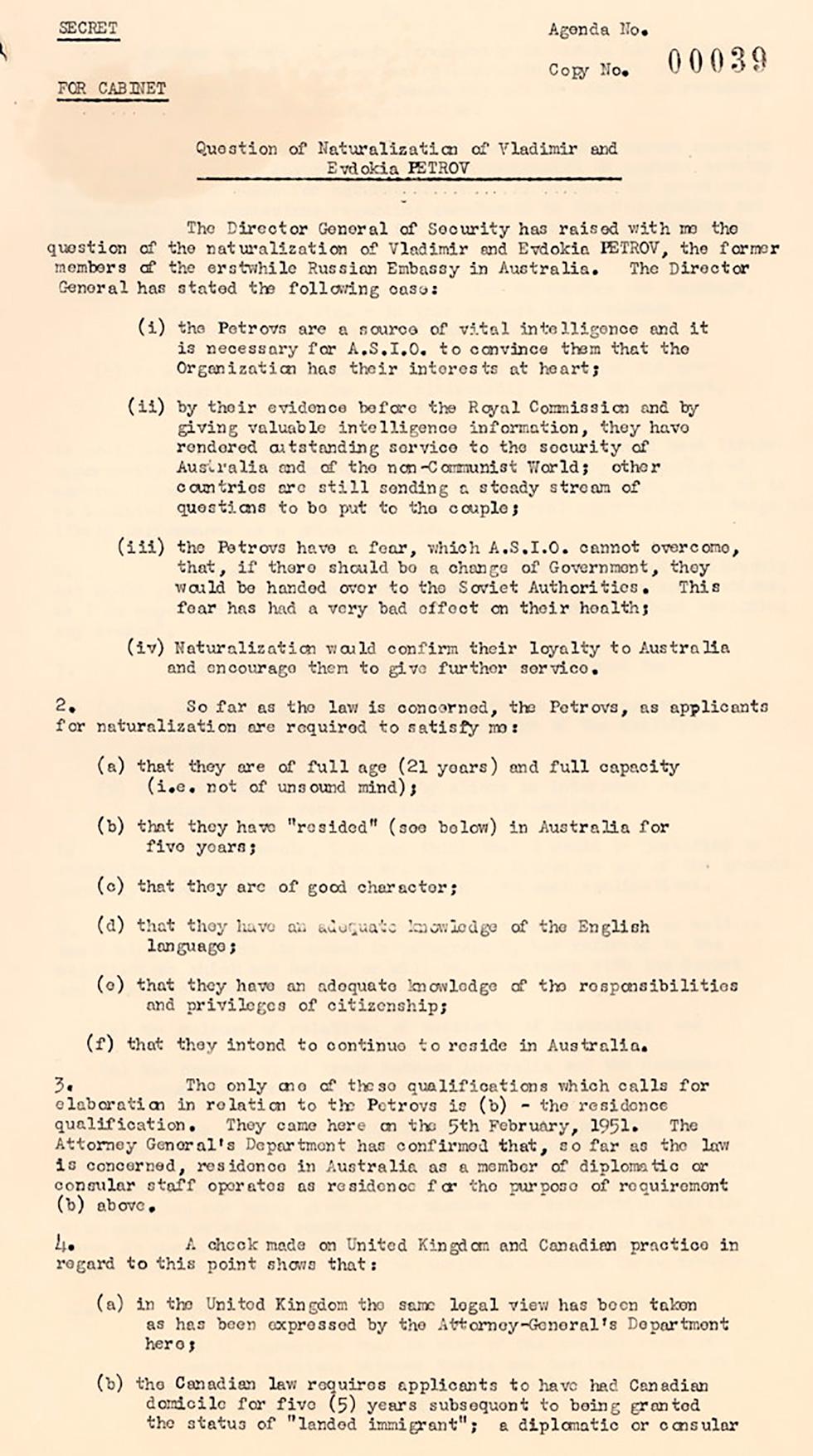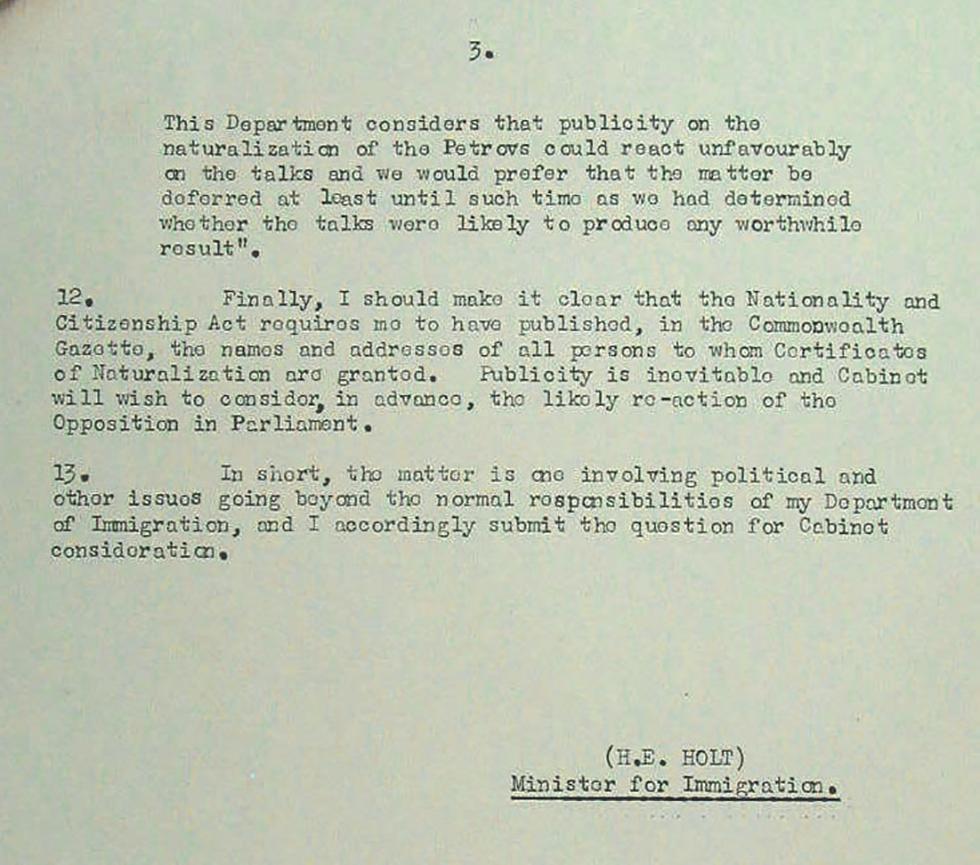
Copy of a secret submission to Cabinet.

Copy of a secret submission to Cabinet.

Copy of a secret submission to Cabinet.
Aboriginal and Torres Strait Islander people should be aware that the National Archives' website and collection contain the names, images and voices of people who have died.
Some records include terms and views that are not appropriate today. They reflect the period in which they were created and are not the views of the National Archives.


Copy of a secret submission to Cabinet.

Copy of a secret submission to Cabinet.

Copy of a secret submission to Cabinet.
[Page 1]
SECRET [underlined]
FOR CABINET [underlined]
Agenda No.
Copy No. 00039
[Heading:] Question of Naturalization of Vladimir and Evdokia PETROV
The Director General of Security has raised with me the question of the naturalization of Vladimir and Evdokia PETROV, the former members of the erstwhile Russian Embassy in Australia. The Director General has stated the following case:
(i) the Petrovs are a source of vital intelligence and it is necessary for A.S.I.O. [Australian Security Intelligence Organisation] to convince them that the Organization has their interests at heart;
(ii) by their evidence before the Royal Commission and by giving valuable intelligence information, they have rendered outstanding service to the security of Australia and of the non-Communist World; other countries are still sending a steady stream of questions to be put to the couple;
(iii) the Petrovs have a fear, which A.S.I.O. cannot overcome, that, if there should be a change of Government, they would be handed over to the Soviet Authorities. This fear has had a very bad effect on their health;
(iv) Naturalization would confirm their loyalty to Australia and encourage them to give further service.
2. So far as the law is concerned, the Petrovs, as applicants for naturalization are required to satisfy me:
(a) that they are of full age (21 years) and full capacity (i.e. not of unsound mind);
(b) that they have "resided" (see below) in Australia for five years;
(c) that they are of good character;
(d) that they have an adequate knowledge of the English language;
(e) that they have an adequate knowledge of the responsibilities and privileges of citizenship;
(f) that they intend to continue to reside in Australia.
3. The only one of these qualifications which calls for elaboration in relation to the Petrovs is (b) – the residence qualification. They came here on the 5th February 1951. The Attorney general's Department has confirmed that, so far as the law is concerned, residence in Australia as a member of diplomatic or consular staff operates as residence for the purpose of requirement (b) above.
4. A check made on United Kingdom and Canadian practice in regard to this point shows that:
(a) in the United Kingdom the same legal view has been taken as has been expressed by the Attorney-General's Department here;
(b) the Canadian law requires applicants to have had Canadian domicile for five (5) years subsequent to being granted the status of "landed Immigrant"; a diplomatic or consular
[Page 2]
officer seeking to remain permanently in Canada has to apply for the latter status after relinquishing his post and the time previously spent in Canada may not be counted as residence for the purpose of naturalization.
5. As a matter of policy, it is not altogether beyond question that periods spent in Australia as the representative of another country should qualify an alien for naturalization. As Cabinet has previously been advised in submissions regarding amendments to the Nationality and Citizenship Act, the basic reason for having a residence qualification is twofold:
(a) to give the new settler adequate time to acquire our language, customs, ideals, etc. – in this respect the residence qualification is a period of "assimilation";
(b) to afford the Government an opportunity to assess the now settler’s fitness for full citizenship – from this aspect, the period is one of "probation".
It could happen that a diplomatic or consular official could have little opportunity to mix with the Australian community during his period of service in an official capacity, and it could be argued that, while he is so isolated from normal conditions there is no real opportunity to judge his likely performance as a private citizen.
6. If such a view were adopted, the Nationality and Citizenship Act would give ample discretionary power to refuse their applications, as I am empowered to grant or withhold naturalization "without assigning any reason".
7. As against this view, it should be mentioned that –
(a) the United Kingdom Government has, in the past, accepted diplomatic and consular service of the qualifying period;
(b) in Australia, periods spent by aliens in internment camps during the war were also subsequently accepted.
8. On the whole, I do not think that I would be justified in withholding naturalization from Mr. and Mrs. Petrov on any of the grounds normally taken into account in connection with such applications.
9. The Secretary, Department of External Affairs, as well as mentioning the point discussed in paragraph 5, has referred to the negotiations which are being, or will be, undertaken with the Soviet and satellite Governments for –
(a) the release of relatives of residents of Australia; and
(b) the opening up of trade between Australia and the Communist countries concerned.
10. As to (a), it is difficult to foresee just what would be the re-action [sic] of the Soviet and satellite Governments to news of the Petrovs' being granted naturalization. Another question which could have some influence on Soviet re-action [sic] to (a) is, of course, the consideration now being given as to whether our extradition treaties with certain satellite countries should be denounced. I feel it would serve no purpose in regard to (a), and perhaps to (b) also, to defer naturalization of the Petrovs if we decide to denounce these treaties.
11. As to (b), the Department of Trade has stated –
"You will appreciate that in view of the present state of diplomatic relations between Russia and Australia, we must approach the trade discussions with the Russian Trading Agencies in London very cautiously.
[Page 3]
This department considers that publicity on the naturalization of the Petrovs could react unfavourably on the talks and we would prefer that the matter be deferred at least until such time as we had determined whether the talks were likely to produce any worthwhile result."
12. Finally, I should make it clear that the Nationality and Citizenship Act requires me to have published, in the Commonwealth Gazette, the names and addresses of all persons to whom Certificates of Naturalization are granted. Publicity is inevitable and Cabinet will wish to consider in advance, the likely re-action [sic] of the Opposition in Parliament.
13. In short, the matter is one involving political and other issues going beyond the normal responsibilities of my Department of Immigration, and I accordingly submit the question for Cabinet consideration.
(H.E. HOLT)
Minister for Immigration [underlined]
This is copy 39 of a Cabinet submission made by the Minister for Immigration, Harold Holt, seeking Cabinet agreement to a proposal to grant Australian citizenship to Russian defectors Vladimir and Evdokia Petrov. Copy 39 is filed as 'folio 16' on a 1956 Department of External Affairs file titled 'Naturalization queries related to Mr and Mrs V M Petrov'. In this excerpt, the Minister for Immigration outlines the reasons why the Petrovs should be given naturalisation and how they satisfy the requirements for this process.
Cabinet agreed to the proposal and the Petrovs became Australian citizens in the same year, and lived in suburban Melbourne under the names Sven Allyson and Anna Allyson.
Learning resource text © Education Services Australia Limited and the National Archives of Australia 2010.
Learn how to interpret primary sources, use our collection and more.
